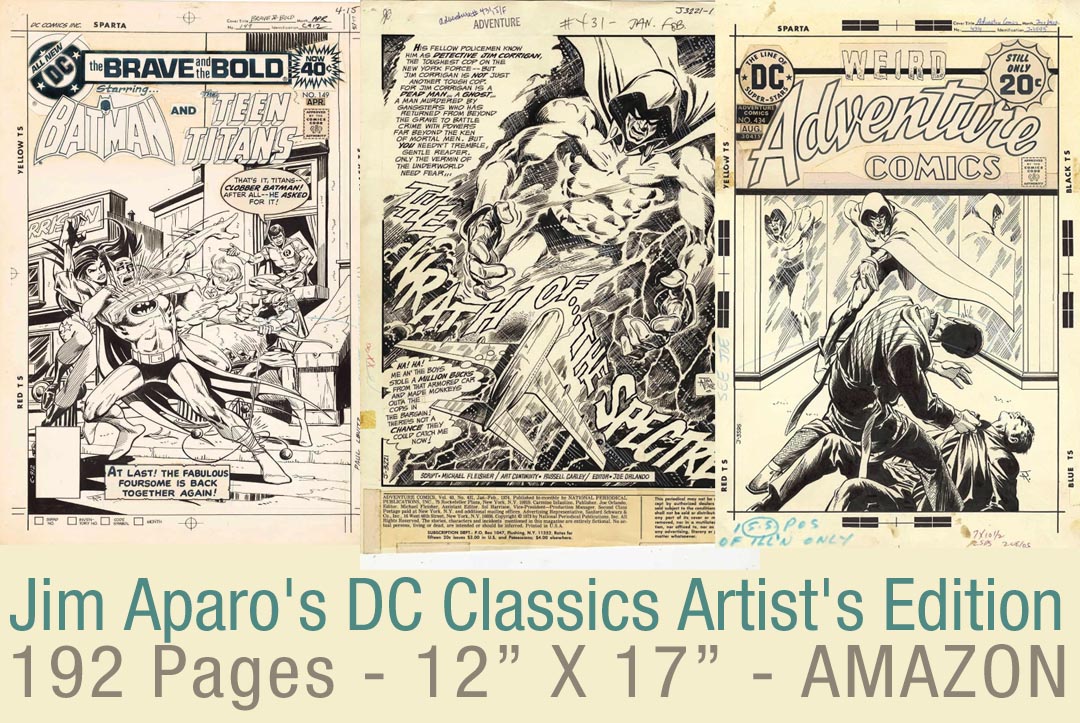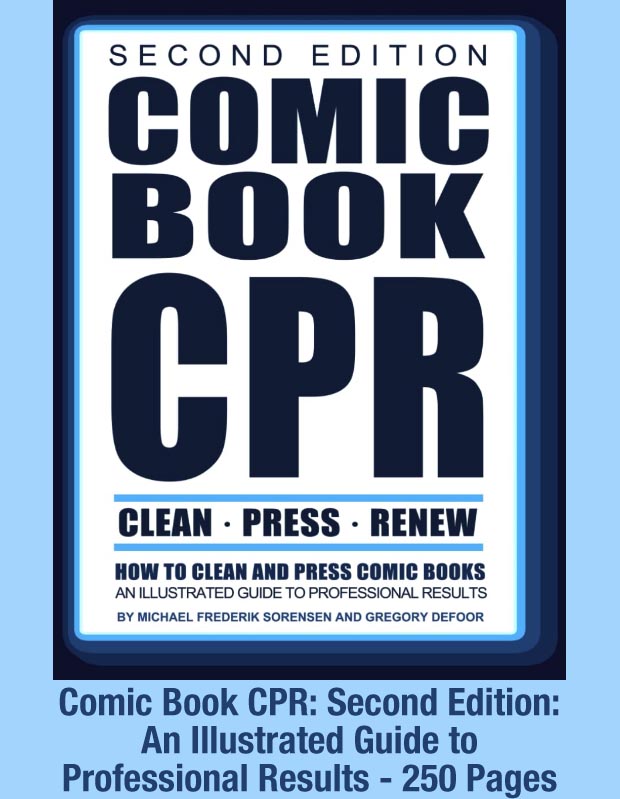Archive Page 2182
August 2023
Review of I Escaped a Chinese Internment Camp – Comicsbeat
The story chronicles the systematic abuse of a Uyghur family in the Xinjiang area and their eventual escape from China.
It takes a certain steeling of one’s stomach to read a book like this, even though it’s short.
Batman: City of Madness by Christian Ward coming out with redesigns of Bat-Villains
Appears to feature a horror-themed version of Gotham City focusing on "the world of Gotham Below, the Court of Owls, and a Gotham City that's been breached by evil doppelgängers." Art samples and article at MSN Looper
Barbie hits $600 million domestic box office/$1,383,909,000 worldwide, and Equalizer 3 takes $68,350,000 worldwide – Yahoo
Artists banding together for class action suit against AI generator software companies using their work
Story at Oregon Live
The legal ability of AI companies to siphon off other people's work is only carrying forward the precedent established by companies like Google in the earlier days of the internet. Search engine software curates the internet and makes use of people's visual works without permission in order to provide search results. This has led to how today tech companies have a legal leverage within copyright law because the functions and abilities of these softwares, from the algorithms of Google to the AI revolution of today, were not envisioned when these copyright laws were made. AI companies will likely continue to be treated legally as a human creator who produces derivative but re-imagined or altered artwork that is visually linked to some other work but is otherwise original, something protected within copyright law so that caricature, political cartoonists, and all kinds of social commentary in the arts can be produced without lawsuits. This is passing along legal rights that belong to human beings to non-human production software owned by a corporation (typically) with the result being a legal dodge to pay out compensation for work.
That AI is not human, and for that matter, the deeper issue of corporations themselves not being human either, touches on the fundamental basis of these dilemmas of artists getting ripped off: a non-human entity cannot of its own ability be either responsible or liable, but certainly the humans controlling it can. But as it stands right now, there is a bizarre and unthinking application of human freedoms being given to non-human software applications. AI does not create anything, it manufactures images dependent upon the way the application is designed by humans to do so.
The "clean room" way of dealing with this is to require all of the images being "fed" into an AI (or for that matter, Google search engines) be either licensed by the companies owning the AI (or the various Googles) from artists, artist estates or museums, or for those companies to only delve forward using already existing public domain artworks, or to hire staffs of artists to produce work to go into the "training."
There is a lot of fudging about definitions, but it seems obvious to me that AI and search engines are not artists, they're industrial tools and as such can be required to stand up to audit on what they are sourcing from, just like a can of beans has to stand up to audit about where the beans come from.
If copyright law does not empower the artist to say "no" to being used by an AI company, and for that matter, the much more ominous powers of Google, what is the actual legal status of an artist?
Connecticut comic book store closure – victim of "galactic shifts in the industry" – MSN Hartford Courant
Article discusses the impact of changes in the industry and the effect of the pandemic shutdowns, citing that Free Comic Book Day could "pack people in" but the overall trend was obvious and "inevitable..."
[the owner] ...cites major changes in how the major comics companies DC and Marvel distribute their titles to stores. First, DC left the industry’s main distributor, Diamond Comics, for a new network of distributors that caused confusion and disruptions for months. Then Marvel made its own changes. Meanwhile, the shutdowns due to the pandemic led many comic buyers to buy their books from the Internet instead. There are also now online options, like DC Universe and Comixology, where subscribers can read digital editions of comics if they don’t need to own a physical copy. “This is all making it very hard for your standard brick-and-mortar stores,” Policki said.
The eight variant covers of Predator vs. Wolverine #1
Story at Space.com
Ranking the "free" AI art engines – Gizmodo
Comparison of image generation with discussion of the programs Artbreeder, ModelScope, Zeroscope, Pixray, Runway TNight Cafe, Shutterstock AI Image Generator, Dream Studio, Hotpot, Runway, Stable Diffusion, VQGAN+CLIP, StarryAI, Dall-E Mini, Deep Dream Generator, Dall-E 2, Wombo Dream, Stable Diffusion 2.1, Bing Image Creator, Leonardo AI, CatBird AI.
The article briefly talks about the formerlly free Midjourney AI .
DC Comics beach covers – AOL – Wonder Woman, Batman, Nightwing, Nuba and others in their swimsuits
Oppenheimer and Barbie provide big help to deliver $4 billion box office, a record since the era of the pandemic began – MSN Variety - Last year's peak was $3.4 billion due to Top Gun: Maverick's huge billion-dollar box office
Profile of Hong Kong cartoonist Bonnie Pang – South China Morning Post – Known for IT Guy and Art Girl
Equalizer 3 grabs $34 million box office start, could go to $45 million for holiday weekend – MSN Variety
Hard numbers sales charts
Story at Comicsbeat
Using Comichron estimates, article has some figures to show, plus the statement that what's needed are actual comics shipped numbers from distributers.
Captain Marvel #1 Variant Covers – Superherohype
Marvel's relaunch of the character in 4-color as we move toward The Marvels feature film release - some covers look like Brie Larson, some do not. The new Captain Marvel series is written by Alyssa Wong. The article lists out the various artists.
Gwenyth Paltrow no longer Pepper Potts
Story at Bounding into Comics
Is Blue Beetle a bomb?
Story at MSN MovieWeb
Article asks the question but doesn't get near the answer, instead it builds a defense for the film which it calls an "endearing narrative" and provides a fairly deep backstory for the production and how the film was elevated from being originally a "straight to streaming" project and then got turned into a relatively low budget superhero feature film.
Anime is marching forward: Netflix invests in bringing the $20 billion One Piece franchise to the world
Story at MSN UK Telegraph
Indy comics and Mark Millar: reviving interest in comic books and the advantage that comes for everybody with a healthier DC and Marvel – Comicbook
Listening to [Mark Millar] talk, the market sounds pretty dire. He talks about comics retailers who are struggling to keep their heads above water and claims there are only a couple of good books at Marvel or DC at one time -- no longer enough to force the audience to make hard choices with their dollars, barely even enough to motivate people in through the comic shop doors. And his prognosis for creator-owned books isn't much better.
The coming of One-Piece to Netflix
Story at Washington Post
The Flash comes to HBO Max streaming but fails to top Black Adam's numbers – Superhero Hype MSN
Forbes: Who is to blame for Disney's money-losing ways?
Story at Forbes
Feige and D’Amaro have championed ... outdated models....
The time-line of what's been happening at Disney over the years looks good in the article, but the analysis is faulty in places, the most obvious when it claims that the huge adult audience for Marvel superhero films came from people who were already associated with the characters which they "cherished from childhood." Of course comic book fans were on board with the Marvel superhero films right from the start when Iron Man came out, but the number of comic book fans out there is a relatively small group. People who had seen some of the Marvel animated shows in the past are a larger group, but really, the 2008 release of Iron Man had several advantages which had nothing to do with the four-color world: a respected lead actor, a good preview trailer, and it wasn't made by Disney but by Marvel Studios. Also, and maybe this is the second most important thing that fed Iron Man's initial success, Batman Begins 2005 and Spiderman 2002 were money-makers and had extended life spans in home video (this is before the era of streaming when entertainment dollars were spent differently, and strong and sizeable profits were churned out by VHS, DVD and Blu Ray sales), the point is that there was an audience for superhero films that were able to maintain that quality level (there were quite a few superhero film titles in the 2000's leading up to Iron Man that had so-so quality and so-so box office) and so as it was then, as it is now: quality, name actors, and good, strategic timing when entering theaters gives a movie a shot at success, unless it can also play the joker wild card that so few films have, which is genre-remaking innovation, such as Star Wars, The Matrix, Taken, and again, Burton's Baman from 1989.
The article goes into the woes of streaming and how Disney apparently bet a huge amount of future earnings on turning streaming on Disney+ into a bonanza. Instead the streaming service loses money (reportedly $512 million this past year alone) and Disney has piled-up debt and is now famously liable for a huge cash payment of reportedly $9.2 billion to Comcast in January 2024. Yikes!
The growth of paper comic book publishing estimates at 2% through 2027 – Benzinga
But it looks like they're talking about Manga titles, generally, and betting on the promotional impact of TV shows and movies.


Original page August 21, 2023


